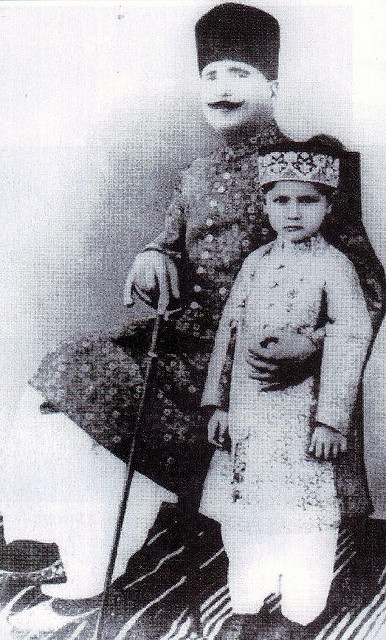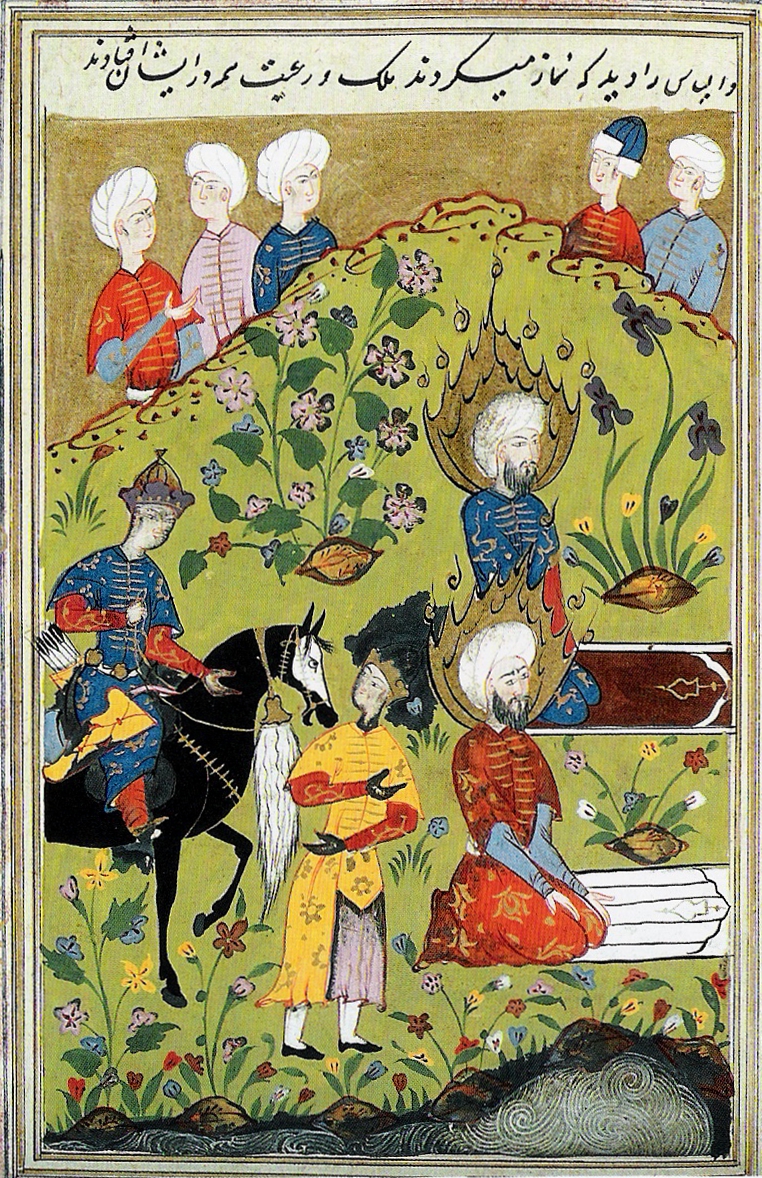|
Khizr-i-Rah
The "Khizr-i-Rah" ("The Guided Path") is a poem in Urdu written in 1922 by Sir Muhammad Iqbal and published in his 1924 collection ''Bang-i-dara ''The Call of the Marching Bell'' ( ur, , ''Bang-e-Dara''; published in 1924) was the first Urdu philosophical poetry book by Muhammad Iqbal, one of the greatest poet-philosophers of the sub-continent of India. Content The poems in ''The Call ...''. It deals with the subject of the political future of Muslims. The poem is an imaginary conversation between Iqbal and Khizr (The Guide). Iqbal, while sitting alone one night, sees Khizr appear before him who asks him about the cause of his loneliness and restlessness. Iqbal tells him about many things he has failed to understand in life and Khizr explains to him the secrets of those things. The three main topics of the conversation were "the secret of life", "the Governments" and the "downfall of Muslims". See also * Index of Muhammad Iqbal–related articles References Poe ... [...More Info...] [...Related Items...] OR: [Wikipedia] [Google] [Baidu] |
Index Of Muhammad Iqbal–related Articles
This page list topics related to Muhammad Iqbal. * Muhammad Iqbal’s concept of Khudi * Muhammad Iqbal’s educational philosophy * Madani–Iqbal debate * Muhammad Iqbal bibliography * Allahabad Address * Works of Muhammad Iqbal * Iqbal Academy Pakistan Poem * Iblees Ki Majlis-e-Shura * Sare Jahan se Accha * Tarana-e-Milli * The Mosque of Cordoba * Lab Pe Aati Hai Dua * Khizr-i-Rah * Saqi Namah * Tulu'i Islam * Khizr-i-Rah * Gulshan-i Raz-i Jadid Works by Iqbal * The Call of the Marching Bell * The Development of Metaphysics in Persia * Gift from Hijaz * Ilm Al-Iqtisad * Javid Nama * Message from the East * The Reconstruction of Religious Thought in Islam * The Rod of Moses * Gabriel's Wing * Persian Psalms * Shikwa and Jawab-e-Shikwa * The Secrets of the Self * The Secrets of Selflessness * What Should Then Be Done O People of the East Works about Iqbal * Glory of Iqbal * Zinda Rood Family members * Javed Iqbal * Nasira Iqbal * Yousuf Salahuddin * Walid Iqbal Mem ... [...More Info...] [...Related Items...] OR: [Wikipedia] [Google] [Baidu] |
The Call Of The Marching Bell
''The Call of the Marching Bell'' ( ur, , ''Bang-e-Dara''; published in 1924) was the first Urdu philosophical poetry book by Muhammad Iqbal, one of the greatest poet-philosophers of the sub-continent of India. Content The poems in ''The Call of the Marching Bell'' was written by Iqbal over a period of twenty years; the collection is divided into three parts: #The book is named "The call of the Marching Bell" [Bang-e-Dara]. It is a bell that people used to ring in old times to awaken the travelers that now it is time to move on to their next destination, this book has the same purpose to awaken the Muslims of Hindustan and remind them that this is time for them to move on. This poem helped the Muslims to wake up and know who they really are and what is their purpose. #Poems written before 1905, the year Iqbal left British India for England. These include nursery, pastoral, and patriotic verses. "Saare Jahan Se Achcha, Tarana-e-Hindi" ("The Song of India") has become an anthem ... [...More Info...] [...Related Items...] OR: [Wikipedia] [Google] [Baidu] |
Poem
Poetry (derived from the Greek ''poiesis'', "making"), also called verse, is a form of literature that uses aesthetic and often rhythmic qualities of language − such as phonaesthetics, sound symbolism, and metre − to evoke meanings in addition to, or in place of, a prosaic ostensible meaning. A poem is a literary composition, written by a poet, using this principle. Poetry has a long and varied history, evolving differentially across the globe. It dates back at least to prehistoric times with hunting poetry in Africa and to panegyric and elegiac court poetry of the empires of the Nile, Niger, and Volta River valleys. Some of the earliest written poetry in Africa occurs among the Pyramid Texts written during the 25th century BCE. The earliest surviving Western Asian epic poetry, the ''Epic of Gilgamesh'', was written in Sumerian. Early poems in the Eurasian continent evolved from folk songs such as the Chinese ''Shijing'', as well as religious hymns (the Sanskrit ' ... [...More Info...] [...Related Items...] OR: [Wikipedia] [Google] [Baidu] |
Sir Muhammad Iqbal
Sir Muhammad Iqbal ( ur, ; 9 November 187721 April 1938), was a South Asian Muslim writer, philosopher, Quote: "In Persian, ... he published six volumes of mainly long poems between 1915 and 1936, ... more or less complete works on philosophical themes" (p. xiii)" Scholar and politician, whose poetry in the Urdu language is considered among the greatest of the twentieth century, Quote: "In Urdu, Iqbal is allowed to have been far the greatest poet of this century, and by most critics to be the only equal of Ghalib (1797–1869). ... the Urdu poems, addressed to a real and familiar audience close at hand, have the merit of being direct, spontaneous utterances on tangible subjects. (p. xiii)" and whose vision of a cultural and political ideal for the Muslims of British-ruled India was to animate the impulse for Pakistan. He is commonly referred to by the honorific Allama (from ). Born and raised in Sialkot, Punjab in an ethnic Kashmiri Muslim family, Iqbal completed his B.A. ... [...More Info...] [...Related Items...] OR: [Wikipedia] [Google] [Baidu] |
Khidr
Al-Khidr () ( ar, ٱلْخَضِر, al-Khaḍir), also transcribed as al-Khadir, Khader, Khidr, Khizr, Khazer, Khadr, Khedher, Khizir, Khizar, is a figure described but not mentioned by name in the Quran as a righteous servant of God possessing great wisdom or mystic knowledge. In various Islamic and non-Islamic traditions, Khidr is described as a messenger, prophet or wali, who guards the sea, teaches secret knowledge and aids those in distress. He prominently figures as patron of the Islamic saint ibn Arabi. The figure of al-Khidr has been syncretized over time with various other figures including Dūraoša and Sorūsh in Iran, Sargis the General and Saint George in Asia Minor and the Levant, Samael (the divine prosecutor) in Judaism, Elijah among the Druze, John the Baptist in Armenia, and Jhulelal in Sindh and Punjab in South Asia. Though not mentioned by name in the Quran, he is named by Islamic scholars as the figure described in as a servant of God who has been given ... [...More Info...] [...Related Items...] OR: [Wikipedia] [Google] [Baidu] |
Poetry By Muhammad Iqbal
Poetry (derived from the Greek ''poiesis'', "making"), also called verse, is a form of literature that uses aesthetic and often rhythmic qualities of language − such as phonaesthetics, sound symbolism, and metre − to evoke meanings in addition to, or in place of, a prosaic ostensible meaning. A poem is a literary composition, written by a poet, using this principle. Poetry has a long and varied history, evolving differentially across the globe. It dates back at least to prehistoric times with hunting poetry in Africa and to panegyric and elegiac court poetry of the empires of the Nile, Niger, and Volta River valleys. Some of the earliest written poetry in Africa occurs among the Pyramid Texts written during the 25th century BCE. The earliest surviving Western Asian epic poetry, the ''Epic of Gilgamesh'', was written in Sumerian. Early poems in the Eurasian continent evolved from folk songs such as the Chinese ''Shijing'', as well as religious hymns (the Sanskrit ''R ... [...More Info...] [...Related Items...] OR: [Wikipedia] [Google] [Baidu] |

.jpg)


